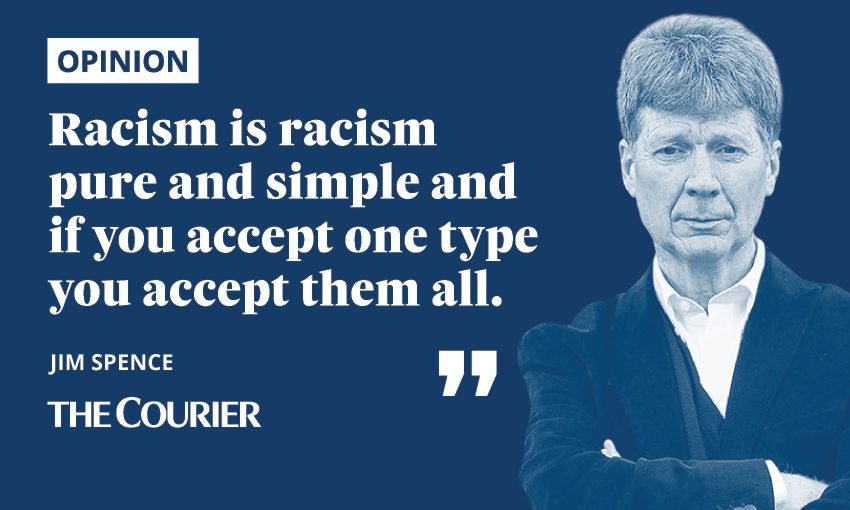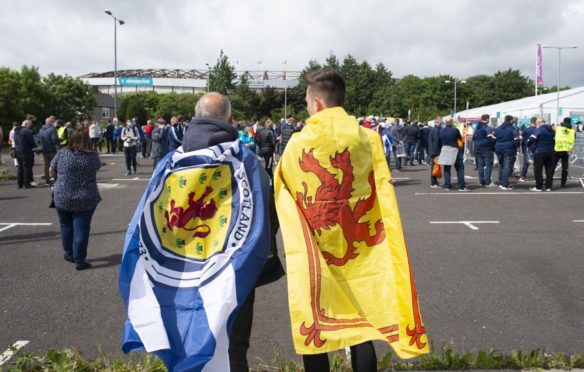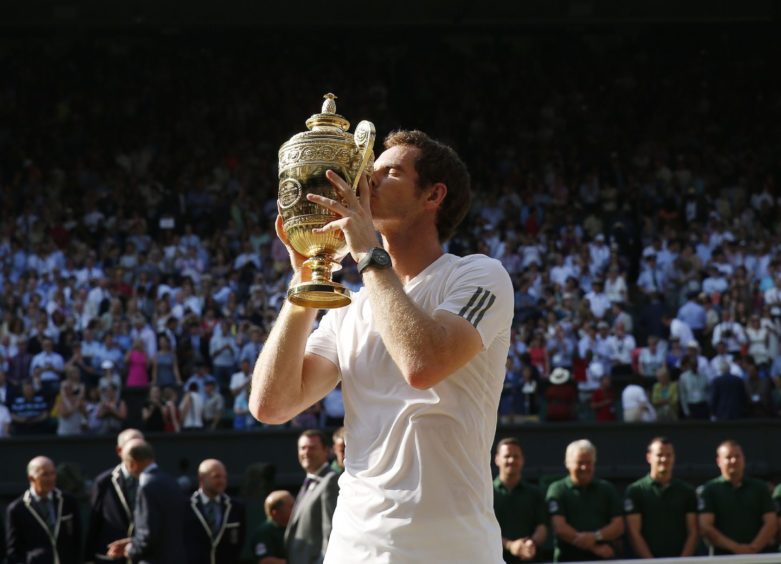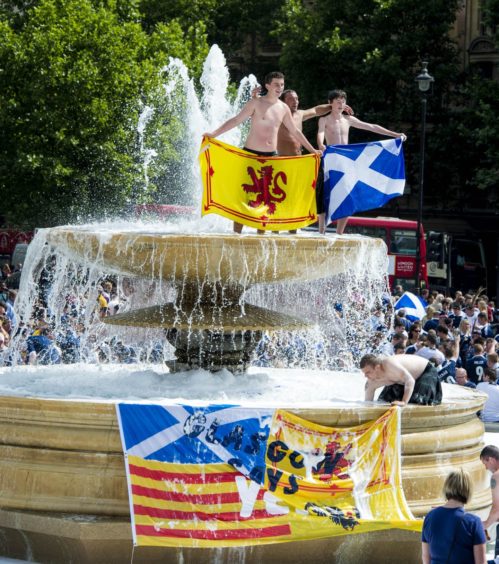There will be some Scottish football fans who can’t see the contradiction between insisting our players take the knee like the English in Friday’s match at Wembley, and the chants about ‘We F***ing hate England’ doing the rounds on Twitter.
They need to wise up and grow up.
If you want to stand against racism, or indeed kneel, then you can’t be picky and pass one type off as humorous repartee while furrowing your brow grievously against another.
Racism is racism pure and simple and if you accept one type you accept them all; football and sport doesn’t give you a free discretionary banter pass to abuse and insult.
"If you hate the F******* English" from xenophobic Scotland fans.
Bet there's not one word from the ever offended @HumzaYousaf @NicolaSturgeon @JohnMasonMSP or any @policescotland action@ScotTories @Daily_Record @DailyMailUK @Telegraph pic.twitter.com/3x6lMi0ShS
— Nasty Nic (@Jockiestan) June 14, 2021
I was interviewed about the European Championships for the Alex Salmond show on Russia Today which is due to air this Thursday.
He asked me about the relationship between our international football fortunes and how I thought they affect our views and confidence on the independence debate.
Ahead of the match with the ‘Auld Enemy’ it’s a pertinent question, because the game presents the perfect opportunity for folk who conflate sporting endeavour and competition with their political aims and ambitions.

There are those who claim we’ve been long oppressed as a nation, and for them victory or defeat in this game can be used to re-fight battles of yesteryear, settle old scores, and right wrongs both real and imagined.
I’ve never bought into the theory that self confidence in deciding our political future should be susceptible to how well or how badly 11 men do at kicking a ball around.
There are far better barometers, such as economic wellbeing, the health service, and educational standards, which should shape our thinking on such a major issue.
Harmless fun or dangerous nationalism?
The relationship between sport, and football in particular, to national identity is harmless and dangerous in equal measure.
Many of us live our lives vicariously through the achievements of our football teams or sports stars.
Success at the Euros or through Andy Murray at Wimbledon finds an expression of national pride which can range from acceptable exuberance to downright nasty nationalism.
The build up to these Championships, with Scotland having been long term absentees from the latter stages of top competitions, has been one of undisguised patriotism and fervour.
Much of it has been light hearted but as always some folk want to wrap up our football fortunes with our political status and future.
Increasingly I find this flag waving to be uncomfortable. Ninety minute patriotism needn’t translate into seven day week nationalism.
Cheering from the press box
I’m not holier than thou on this issue.
Having made a living from covering sport for over 30 years I have to admit on reflection to some embarrassment at my behaviour behind a microphone when watching both Scottish success stories and sporting disasters unfold.
Working as a BBC Television reporter I can recall being seated on a media bench behind the goalmouth in Paris, and leaping off the bench like a demented dervish when James McFadden’s thunderbolt shot rattled the French net for an unexpected Scottish winning goal.
Still, there’s a big difference between natural enthusiasm for great athletic feats and claiming a sense of national superiority through such accomplishments.
High hopes for our countrymen and women in the competitive arena are fine when we can as Kipling said of victory and defeat, ‘meet with triumph and disaster and treat those two imposters just the same’
However some folk respond to those two elements with a nasty nativist response.
Claiming national superiority from the accomplishments of sporting representatives shouldn’t signify that we are better than others
What does it actually mean if sports stars from Scotland or any other country do well while representing their countries?
There’s genuine absurdity as well as danger in transmitting to the national psyche the achievements of professional sports people who are simply doing their jobs and making their living.
Claiming some sort of national superiority from the accomplishments of our sporting representatives shouldn’t signify that we are somehow better or more virtuous than other people or nations.
Harmless if harnessed
Like the Hoi Polloi in the Colosseum revelling in their chosen gladiator’s victories and defeats, we cheer or groan depending on how our footballers for hire perform on the day.
As long as it’s kept in check it’s a harmless pursuit.
When it boils over into a deep dislike of other countries though, usually always in our case England, then such overt displays of national characteristics become more worrying.
The modern day Tartan Army exudes bonhomie, bevy and boisterousness
But I’ve been at Wembley in the dark days before we reinvented ourselves as modern day kitsch kilted caperers, and witnessed the fighting, the overturned burger vans, and the general mayhem and madness by those who were still angry that Prince Charlie had stopped at Derby.
With some Scots there’s a deep dislike and antipathy towards England; it’s often poorly disguised under the camouflage of really being aimed at their ‘biased media’, as opposed to their ordinary fans.
Only a game
Often though it’s hard to tell where sporting rivalry ends and national prejudice begins.
The majority of Scots walk the rivalry line delicately, but the unedifying temptation for some is to wrap the saltire around our sport and sully it with their politics.
At the end of the day it’s only a game.
As the late great Dundee songwriter Michael Marra neatly put it in his song Hamish the Goalie – ‘Win lose or draw you get home to your bed just the same.’


